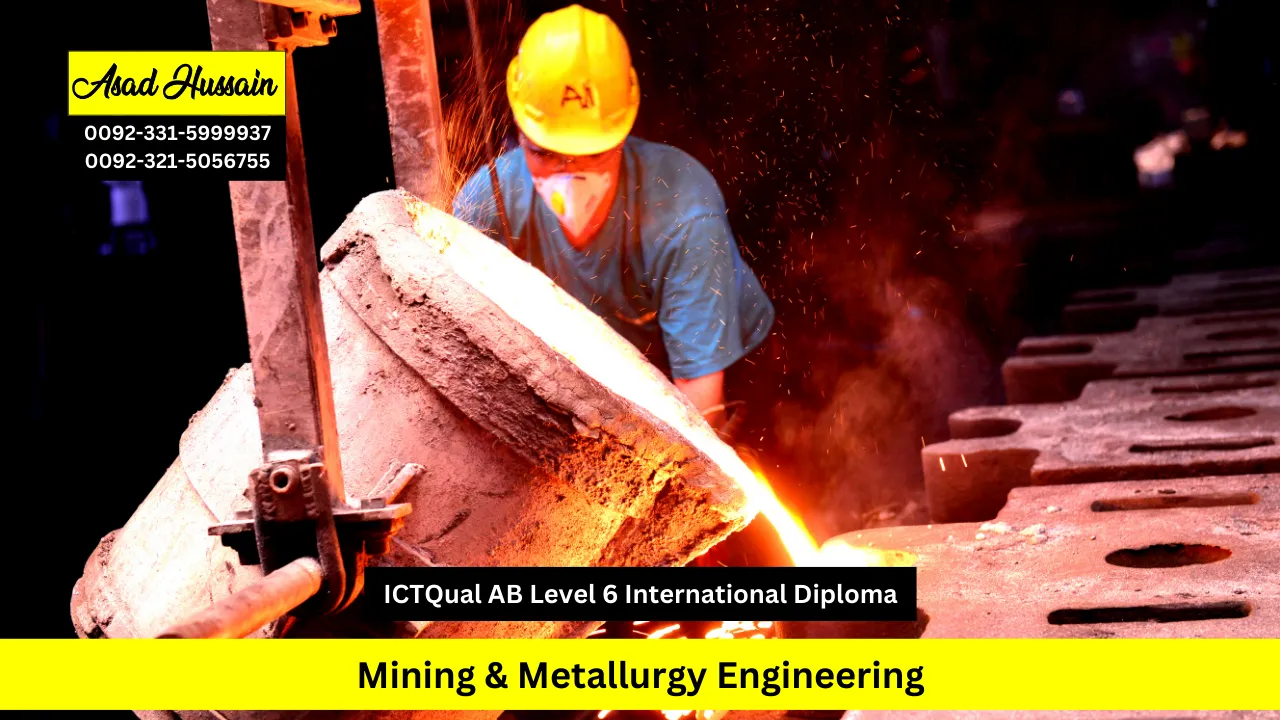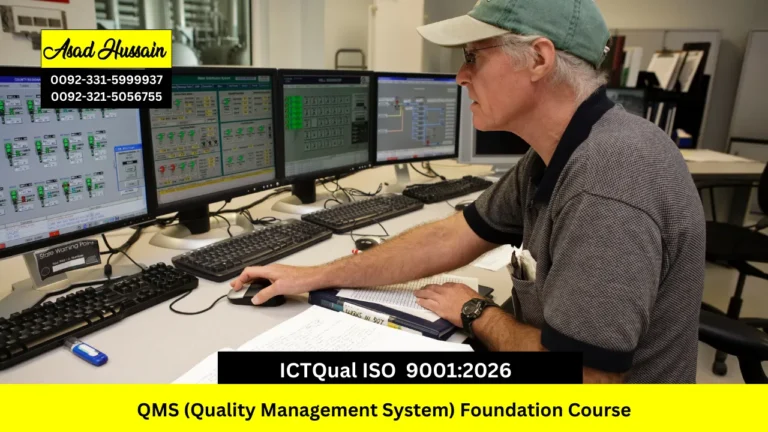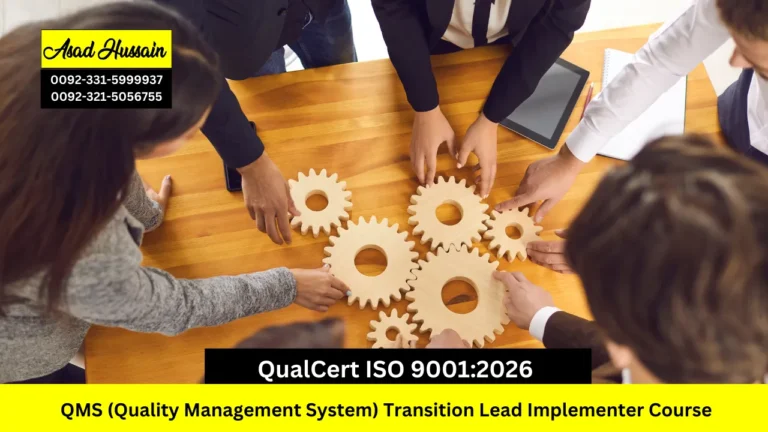Mining and metallurgy are the backbone of the global industrial and manufacturing sectors, driving economic development and technological innovation. The ICTQual AB Level 6 International Diploma in Mining & Metallurgy Engineering equips learners with advanced knowledge, technical expertise, and practical skills essential for careers in mineral extraction, processing, and metallurgical engineering.
ICTQual ABLevel 6 International Diploma in Mining & Metallurgy Engineering covers the principles of mining operations, mineral processing, metallurgy, material science, industrial safety, environmental sustainability, and project management. Learners gain hands-on experience in designing extraction processes, evaluating ore quality, applying metallurgical techniques, and utilizing modern equipment to optimize operational efficiency.
ICTQual ABLevel 6 International Diploma in Mining & Metallurgy Engineering emphasizes real-world applications through case studies, simulations, laboratory exercises, and project-based learning, enabling learners to solve practical engineering challenges and implement sustainable, efficient solutions in mining and metallurgical operations. Graduates are prepared to take on leadership, supervisory, and engineering roles in mining companies, metallurgical plants, research facilities, and industrial projects globally.
Upon successful completion, learners receive a British Council verifiable, MOFA and Embassy attestable certification, recognized worldwide. ICTQual ABLevel 6 International Diploma in Mining & Metallurgy Engineering enhances professional credibility, employability, and career advancement opportunities in the mining and metallurgy sector.
Program Highlights
Study Units
Year 1 – Foundation in Mining & Metallurgy Engineering
- Principles of Mining and Metallurgy Engineering
- Engineering Mathematics
- Fundamentals of Mechanical and Electrical Engineering
- Materials Science and Metallurgy
- Engineering Drawing and Computer-Aided Design (CAD)
- Introduction to Mining Geology and Mineralogy
- Basics of Mining Operations and Techniques
- Fundamentals of Ore Processing and Metallurgical Methods
- Health, Safety, and Environmental Practices in Mining
- Introduction to Mining Equipment and Machinery
- Communication and Technical Report Writing
- Introduction to Project Management in Engineering
Year 2 – Intermediate Studies in Mining & Metallurgy Engineering
- Mining Methods and Mine Planning
- Mineral Processing and Extractive Metallurgy
- Rock Mechanics and Geotechnical Engineering
- Advanced Materials and Metallurgical Analysis
- Industrial Automation and Control Systems in Mining
- Mine Surveying and Geomatics Applications
- Industrial Maintenance and Reliability in Mining Operations
- Sustainable Mining Practices and Environmental Management
- Applied Research Methods in Mining and Metallurgy
- Mining Economics and Cost Control
- Project Planning and Mine Operations Management
- Health, Safety, and Risk Management in Metallurgy
Year 3 – Advanced Studies in Mining & Metallurgy Engineering
- Advanced Mining Techniques and Underground Operations
- Advanced Metallurgical Processes and Simulation
- Mineral Resource Evaluation and Optimisation
- Mine Ventilation and Environmental Control Systems
- Smart Mining Technologies and Industry 4.0 Applications
- Robotics and Automation in Mining and Metallurgy
- Cyber-Physical Systems and IoT in Mining Operations
- Professional Ethics and Sustainability in Mining Engineering
- Innovation and Entrepreneurship in Mining & Metallurgy
- Infrastructure and Facility Planning for Mining Projects
- Advanced Research and Analytical Techniques in Metallurgy
- Final Year Major Project (Capstone Project)
To ensure learners are fully prepared for the Level 6 diploma, the program has specific entry requirements covering age, education, professional experience, and language proficiency.
Age Requirements
- Candidates must be 18 years or older at the time of enrollment in ICTQual ABLevel 6 International Diploma in Mining & Metallurgy Engineering.
- Mature learners with relevant technical or engineering experience may also be considered.
Educational Requirements
- Completion of a Level 5 Diploma or equivalent in Mining Engineering, Metallurgy, Mechanical Engineering, or a related field.
- Applicants with a bachelor’s degree in Mining, Metallurgy, Mechanical, or Materials Engineering are eligible.
Professional Experience
- Minimum 1–2 years of hands-on experience in mining, metallurgy, or industrial engineering roles is recommended.
- Practical exposure to mineral extraction, metallurgical processes, or plant operations is advantageous.
English Language Proficiency
- Demonstrated proficiency in English equivalent to IELTS 5.5 or higher.
- Ability to understand technical terminology, follow instructions, and engage in academic and practical learning is essential.
By meeting these entry requirements, learners are fully prepared to maximize their learning experience, develop advanced technical and managerial skills, and advance their careers in mining, metallurgy, and industrial engineering.
The ICTQual AB Level 6 International Diploma in Mining & Metallurgy Engineering equips learners with comprehensive knowledge, practical skills, and strategic capabilities to excel in mining and metallurgical industries. The ICTQual AB Level 6 International Diploma in Mining & Metallurgy Engineering combines foundational theory, applied practices, and advanced engineering techniques to prepare learners for professional and leadership roles in mining operations, metallurgical processes, and resource management.
Year 1 – Foundation in Mining & Metallurgy Engineering
Principles of Mining and Metallurgy Engineering
- Understand fundamental concepts of mining and metallurgical engineering.
- Apply basic principles to analyze mining operations and metallurgical processes.
- Evaluate engineering solutions using measurable performance standards.
Engineering Mathematics
- Apply mathematical methods to solve engineering problems.
- Use quantitative analysis for design, modeling, and process optimization.
- Assess problem-solving accuracy using measurable outcomes.
Fundamentals of Mechanical and Electrical Engineering
- Understand core mechanical and electrical engineering principles.
- Apply engineering fundamentals to mining and metallurgical operations.
- Evaluate system performance and operational efficiency using measurable standards.
Materials Science and Metallurgy
- Analyze properties of metals and alloys for engineering applications.
- Apply metallurgical principles to material selection and processing.
- Assess material performance using measurable testing standards.
Engineering Drawing and Computer-Aided Design (CAD)
- Produce accurate technical drawings for mining and metallurgical projects.
- Apply CAD software for design, modeling, and visualization.
- Evaluate design accuracy using measurable standards and best practices.
Introduction to Mining Geology and Mineralogy
- Understand geological principles and mineral properties relevant to mining.
- Apply mineral identification and classification techniques.
- Assess geological data using measurable analytical methods.
Basics of Mining Operations and Techniques
- Understand mining methods, excavation techniques, and operational workflows.
- Apply practical mining techniques in controlled environments.
- Evaluate operational effectiveness using measurable criteria.
Fundamentals of Ore Processing and Metallurgical Methods
- Apply principles of ore beneficiation and metallurgical processing.
- Conduct basic metallurgical experiments to improve process efficiency.
- Assess process outcomes using measurable performance indicators.
Health, Safety, and Environmental Practices in Mining
- Identify mining hazards and implement safety protocols.
- Apply environmental protection measures in operational settings.
- Evaluate safety and environmental compliance using measurable standards.
Introduction to Mining Equipment and Machinery
- Understand functions and operations of mining machinery and equipment.
- Apply practical skills to operate and maintain equipment safely.
- Assess equipment performance using measurable operational criteria.
Communication and Technical Report Writing
- Develop technical reports and professional communication skills.
- Apply structured documentation for project management and research.
- Evaluate clarity, accuracy, and quality of reports using measurable metrics.
Introduction to Project Management in Engineering
- Understand project management principles in engineering contexts.
- Apply planning, scheduling, and resource allocation techniques.
- Assess project outcomes using measurable performance standards.
Year 2 – Intermediate Studies in Mining & Metallurgy Engineering
Mining Methods and Mine Planning
- Understand advanced mining methods and planning strategies.
- Apply mine planning techniques to optimize resource extraction.
- Evaluate planning efficiency using measurable performance criteria.
Mineral Processing and Extractive Metallurgy
- Apply advanced mineral processing techniques and extraction methods.
- Conduct metallurgical testing to improve yield and quality.
- Assess processing efficiency using measurable outcomes.
Rock Mechanics and Geotechnical Engineering
- Understand rock properties and geotechnical principles.
- Apply stress and stability analysis for mining operations.
- Evaluate geotechnical performance using measurable indicators.
Advanced Materials and Metallurgical Analysis
- Analyze properties and behaviors of metals under operational conditions.
- Apply metallurgical testing techniques for quality control.
- Assess material performance using measurable engineering standards.
Industrial Automation and Control Systems in Mining
- Implement automation and control systems in mining operations.
- Apply PLCs, sensors, and automated equipment for efficiency.
- Evaluate system performance using measurable metrics.
Mine Surveying and Geomatics Applications
- Conduct surveys using modern geomatics technologies.
- Apply mapping and spatial data analysis for operational planning.
- Assess accuracy and precision of surveys using measurable standards.
Industrial Maintenance and Reliability in Mining Operations
- Implement maintenance strategies to enhance operational reliability.
- Apply predictive and preventive maintenance techniques.
- Evaluate maintenance effectiveness using measurable outcomes.
Sustainable Mining Practices and Environmental Management
- Apply environmentally sustainable practices in mining operations.
- Implement strategies to minimize ecological impact.
- Assess environmental compliance using measurable standards.
Applied Research Methods in Mining and Metallurgy
- Conduct applied research for problem-solving and innovation.
- Use quantitative and qualitative methods to analyze mining data.
- Evaluate research findings using measurable scientific standards.
Mining Economics and Cost Control
- Apply economic principles to mining project planning and operations.
- Analyze cost factors and implement cost-control strategies.
- Evaluate economic performance using measurable criteria.
Project Planning and Mine Operations Management
- Plan and manage mining operations for efficiency and safety.
- Apply resource scheduling and operational coordination techniques.
- Assess operational outcomes using measurable performance metrics.
Health, Safety, and Risk Management in Metallurgy
- Implement advanced safety protocols for metallurgical processes.
- Apply risk assessment and mitigation techniques.
- Evaluate safety and risk management outcomes using measurable standards.
Year 3 – Advanced Studies in Mining & Metallurgy Engineering
Advanced Mining Techniques and Underground Operations
- Apply advanced excavation and underground mining methods.
- Implement operational strategies to enhance efficiency and safety.
- Evaluate operational outcomes using measurable performance metrics.
Advanced Metallurgical Processes and Simulation
- Conduct complex metallurgical processes using simulations and experiments.
- Apply process optimization techniques to improve yield and quality.
- Assess process performance using measurable engineering standards.
Mineral Resource Evaluation and Optimisation
- Evaluate mineral deposits for feasibility and operational planning.
- Apply optimization techniques to maximize resource utilization.
- Assess resource efficiency using measurable criteria.
Mine Ventilation and Environmental Control Systems
- Design and implement ventilation systems for underground operations.
- Apply environmental control strategies to ensure safe working conditions.
- Evaluate system effectiveness using measurable indicators.
Smart Mining Technologies and Industry 4.0 Applications
- Integrate IoT, sensors, and digital solutions in mining operations.
- Apply data-driven technologies for operational efficiency.
- Assess technology impact using measurable performance metrics.
Robotics and Automation in Mining and Metallurgy
- Implement robotics and automated systems in mining and metallurgical processes.
- Apply advanced control strategies for operational optimization.
- Evaluate automation outcomes using measurable criteria.
Cyber-Physical Systems and IoT in Mining Operations
- Apply cyber-physical systems to monitor and optimize mining operations.
- Integrate IoT solutions for real-time decision-making.
- Evaluate system performance using measurable indicators.
Professional Ethics and Sustainability in Mining Engineering
- Apply ethical decision-making and sustainability principles in mining projects.
- Ensure responsible management of resources and operations.
- Assess compliance with ethical and sustainability standards using measurable outcomes.
Innovation and Entrepreneurship in Mining & Metallurgy
- Develop innovative solutions for operational challenges in mining and metallurgy.
- Apply entrepreneurial approaches for business and process improvement.
- Evaluate innovation success using measurable criteria.
Infrastructure and Facility Planning for Mining Projects
- Design and plan infrastructure for mining and metallurgical operations.
- Apply project management and engineering principles for facility optimization.
- Assess infrastructure efficiency using measurable performance metrics.
Advanced Research and Analytical Techniques in Metallurgy
- Conduct advanced research using analytical methods and laboratory techniques.
- Apply statistical and experimental methods to improve metallurgical processes.
- Evaluate research outcomes using measurable scientific standards.
Final Year Major Project (Capstone Project)
- Integrate knowledge and skills from all units into a practical applied project.
- Apply engineering, safety, and management principles to solve real-world mining challenges.
- Evaluate project success using measurable operational and academic performance indicators.
Upon completion, learners will possess advanced engineering knowledge, practical competencies, and strategic leadership skills to excel in mining and metallurgical industries, manage complex projects, and implement innovative solutions across diverse industrial contexts.
The ICTQual AB Level 6 International Diploma in Mining & Metallurgy Engineering is designed for learners seeking advanced technical knowledge, practical expertise, and leadership skills in the mining, metallurgical, and industrial engineering sectors. ICTQual ABLevel 6 International Diploma in Mining & Metallurgy Engineering is ideal for individuals aiming to enhance their professional competency, improve employability, and contribute to sustainable and efficient mining and metallurgical operations.
1. Educational Instructors and Trainers
- Enhance teaching capabilities by incorporating advanced mining, metallurgy, and industrial engineering concepts into curricula.
- Stay updated with emerging technologies, industry standards, and sustainable practices to deliver high-quality education.
2. Environmental Advocates and Activists
- Develop an understanding of the environmental impacts of mining and metallurgical processes.
- Advocate for sustainable resource management, waste reduction, and eco-friendly industrial practices.
3. Students and Recent Graduates
- Acquire practical skills, technical knowledge, and industry-recognized certification to enter mining and metallurgical roles confidently.
- Gain exposure to real-world projects, laboratory simulations, and problem-solving scenarios to enhance employability.
4. Career Changers
- Transition from other industries into mining, metallurgy, or industrial engineering careers.
- Obtain internationally recognized credentials and practical experience to establish credibility in a new professional path.
5. Policy Makers and Regulators
- Understand mining operations, metallurgical processes, and safety and environmental regulations to inform policy decisions.
- Ensure industry compliance with national and international standards while promoting responsible and sustainable practices.
ICTQual AB Level 6 International Diploma in Mining & Metallurgy Engineering is ideal for learners committed to professional growth, technical mastery, and sustainable practices in mining and metallurgy. By catering to educators, students, career changers, environmental advocates, and policy makers, the ICTQual AB Level 6 International Diploma in Mining & Metallurgy Engineering prepares graduates to excel in industrial, research, and leadership roles, driving innovation, efficiency, and compliance in the global mining and metallurgical sectors.






